Asparagus is rich in fiber, folate, and antioxidants that may support heart health, digestion, and overall wellness.
This vibrant green vegetable is not only a springtime favorite but also a powerhouse of essential nutrients and plant compounds linked to long-term health benefits. Understanding asparagus’s nutritional value and evidence-backed effects helps you make informed dietary choices for a balanced, nutrient-rich lifestyle.
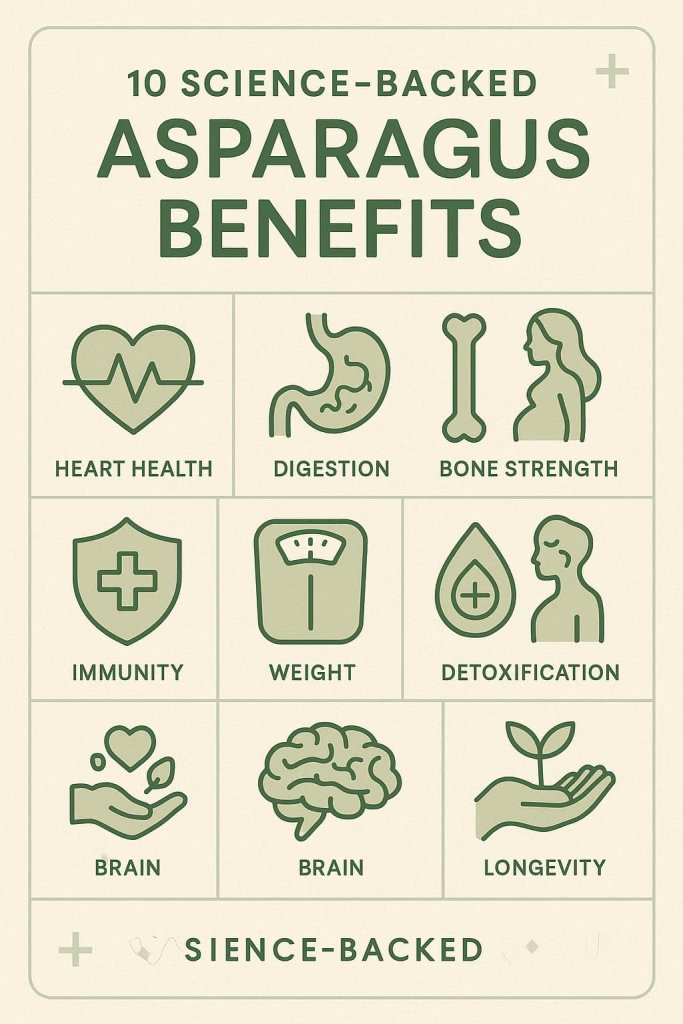
What Is Asparagus? (Overview and Nutrition Profile)
Asparagus (Asparagus officinalis) is a nutrient-dense, spring-harvested vegetable known for its tender spears and mild, earthy flavor.
Belonging to the lily family, it has been cultivated for thousands of years for both culinary and wellness purposes. Today, asparagus is widely recognized for its unique combination of low calories, high fiber, and potent micronutrients that support heart, bone, and digestive health.
There are several common varieties of asparagus:
- Green asparagus: The most widely available type, rich in chlorophyll and antioxidants.
- White asparagus: Grown underground to prevent chlorophyll formation, resulting in a milder flavor.
- Purple asparagus: Contains anthocyanins—antioxidant pigments that may support cellular health.
Asparagus is over 90% water, making it naturally hydrating, while its rich supply of vitamins and minerals contributes to multiple aspects of wellness, from metabolism to immunity.

Nutritional Profile of Asparagus (per 1 cup, cooked – 134 g)
(Source: U.S. Department of Agriculture, FoodData Central, 2025)
| Nutrient | Amount | % Daily Value (%DV) |
|---|---|---|
| Calories | 40 kcal | — |
| Protein | 4.3 g | 9% |
| Fiber | 3.6 g | 13% |
| Carbohydrates | 7.4 g | — |
| Vitamin K | 55 mcg | 46% |
| Folate (Vitamin B9) | 134 mcg | 34% |
| Vitamin A | 756 IU | 15% |
| Vitamin C | 7.5 mg | 8% |
| Potassium | 271 mg | 8% |
| Iron | 2.9 mg | 16% |
| Manganese | 0.3 mg | 13% |
Key Highlights:
- Low in calories, rich in nutrients: Offers a strong nutritional return for its calorie content.
- Excellent source of folate and vitamin K: Vital for DNA synthesis and bone health.
- High in fiber and water: May support digestion, satiety, and hydration.
- Natural source of antioxidants: Includes glutathione, rutin, and polyphenols that help protect against oxidative stress.
According to the Harvard T.H. Chan School of Public Health, vegetables like asparagus provide a unique mix of micronutrients and bioactive compounds that contribute to reduced chronic disease risk and overall metabolic balance.
10 Proven Health Benefits of Asparagus (Backed by Science)
Asparagus is a nutrient-dense vegetable loaded with vitamins, minerals, fiber, and antioxidants that may support overall health and longevity. Modern research supports its role in cardiovascular wellness, digestive balance, and immune resilience — making it a valuable addition to a balanced, whole-food diet.
1. Supports Heart Health
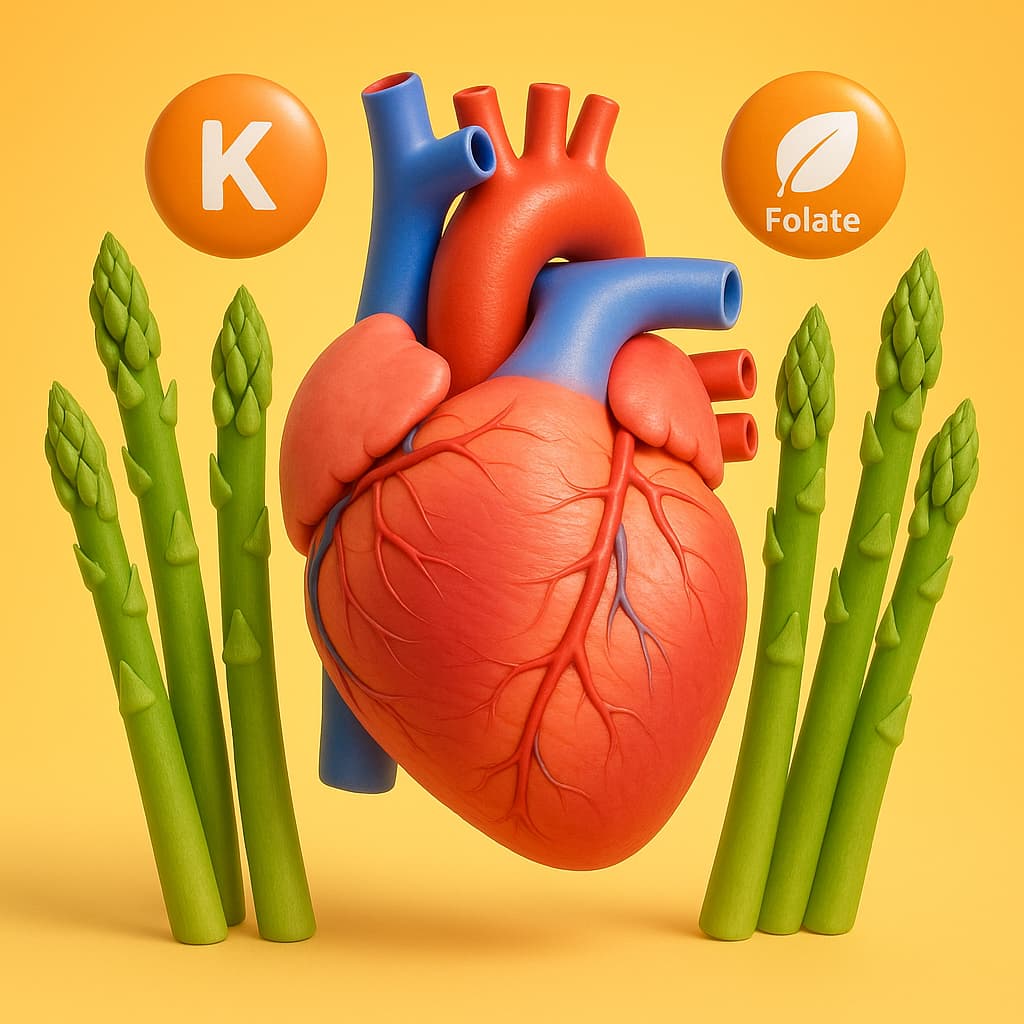
Asparagus contains potassium, folate, and antioxidants that may help maintain healthy blood pressure and vascular function.
- Potassium supports normal blood vessel relaxation and helps balance sodium levels, contributing to better cardiovascular regulation.
- Folate assists in managing homocysteine — an amino acid linked to heart disease when elevated.
According to a 2024 study in the Journal of the American Heart Association, higher intakes of folate-rich vegetables are associated with improved vascular health and reduced cardiovascular events.
Including asparagus regularly in meals can be an easy, evidence-based way to support heart wellness as part of a vegetable-rich diet pattern such as the DASH or Mediterranean diet.
2. Promotes Digestive Health
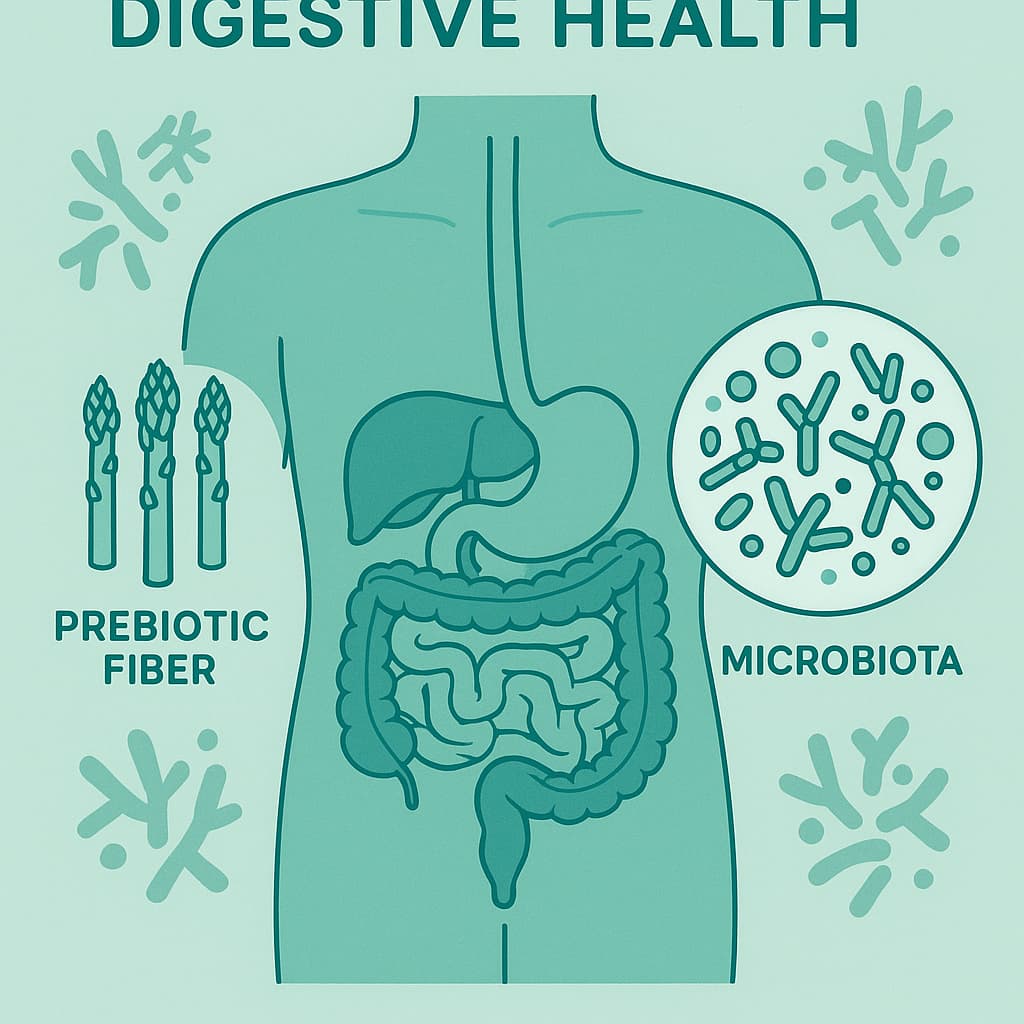
Asparagus is a natural source of inulin, a type of prebiotic fiber that feeds beneficial gut bacteria.
- This fiber supports the growth of Bifidobacteria and Lactobacillus, microorganisms that produce short-chain fatty acids (SCFAs) — key for maintaining colon health and regulating inflammation.
- Regular intake of prebiotic vegetables like asparagus may promote digestive comfort and bowel regularity.
A 2024 review in Frontiers in Nutrition found that inulin-type fructans significantly improve gut microbiota diversity and support intestinal barrier function, contributing to better metabolic and digestive outcomes.
3. May Support Healthy Pregnancy

Asparagus is naturally rich in folate (vitamin B9), an essential nutrient for DNA synthesis and neural tube development in early pregnancy.
The National Institutes of Health (NIH) recommends 600 mcg DFE of folate daily for pregnant adults.
Including asparagus in prenatal meals, alongside folate-rich foods like lentils, citrus fruits, and spinach, may support healthy fetal development. Consistent intake of natural food sources of folate can complement prenatal supplementation and overall pregnancy nutrition.
Note: For personal health decisions, especially during pregnancy, please consult a qualified healthcare professional.
4. Aids Natural Detoxification

Asparagus naturally contains asparagine, an amino acid that supports kidney function and the removal of excess fluid and waste through urination.
This mild diuretic property may help maintain healthy water balance without dehydrating the body.
A study published in Phytotherapy Research (2023) noted that asparagine and related compounds in asparagus may promote urinary tract health and aid natural detoxification processes. Drinking adequate water alongside asparagus intake enhances this effect safely.
5. Supports Bone Health
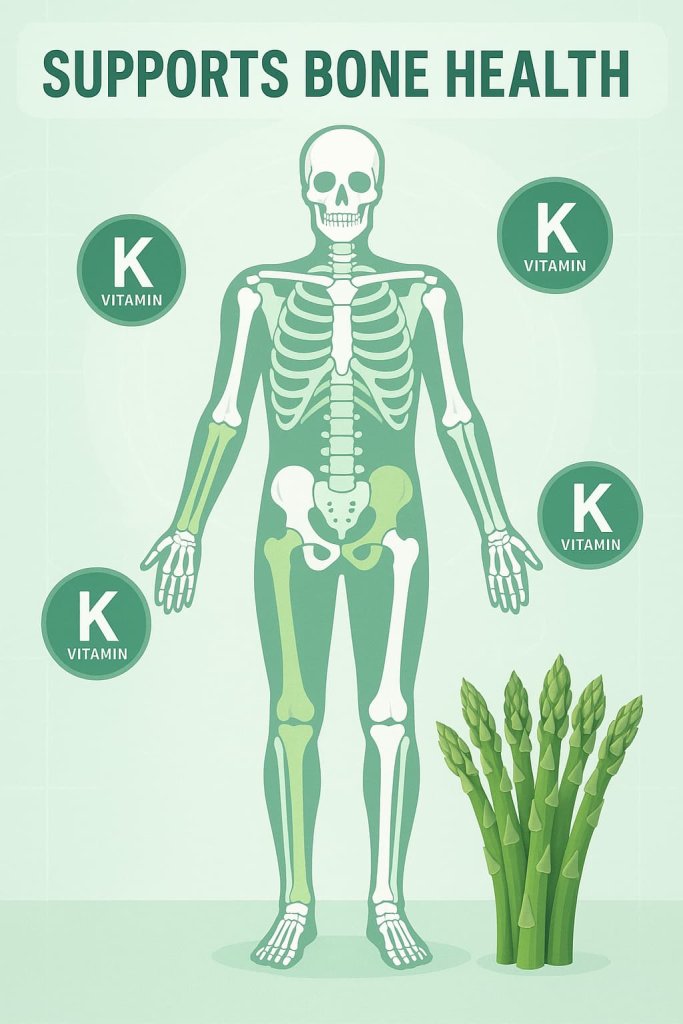
Asparagus is an excellent source of vitamin K, a nutrient essential for bone mineralization and calcium regulation.
A single serving of asparagus provides nearly half of the daily recommended intake, helping the body produce osteocalcin, a protein necessary for binding calcium within the bone matrix and maintaining skeletal strength.
Vitamin K works synergistically with calcium and vitamin D to support optimal bone density and may contribute to reducing the risk of fractures. Consistent intake of vitamin K–rich vegetables, such as asparagus, spinach, and kale, is beneficial for long-term bone health.
For individuals taking blood-thinning medications like warfarin, consistency—not avoidance—is key. According to the University of Iowa Health Care – Warfarin, Your Diet, and Vitamin K Foods, maintaining a steady intake of vitamin K–rich foods helps stabilize blood clotting levels and ensures medication effectiveness under medical supervision.
6. May Support Immune Function
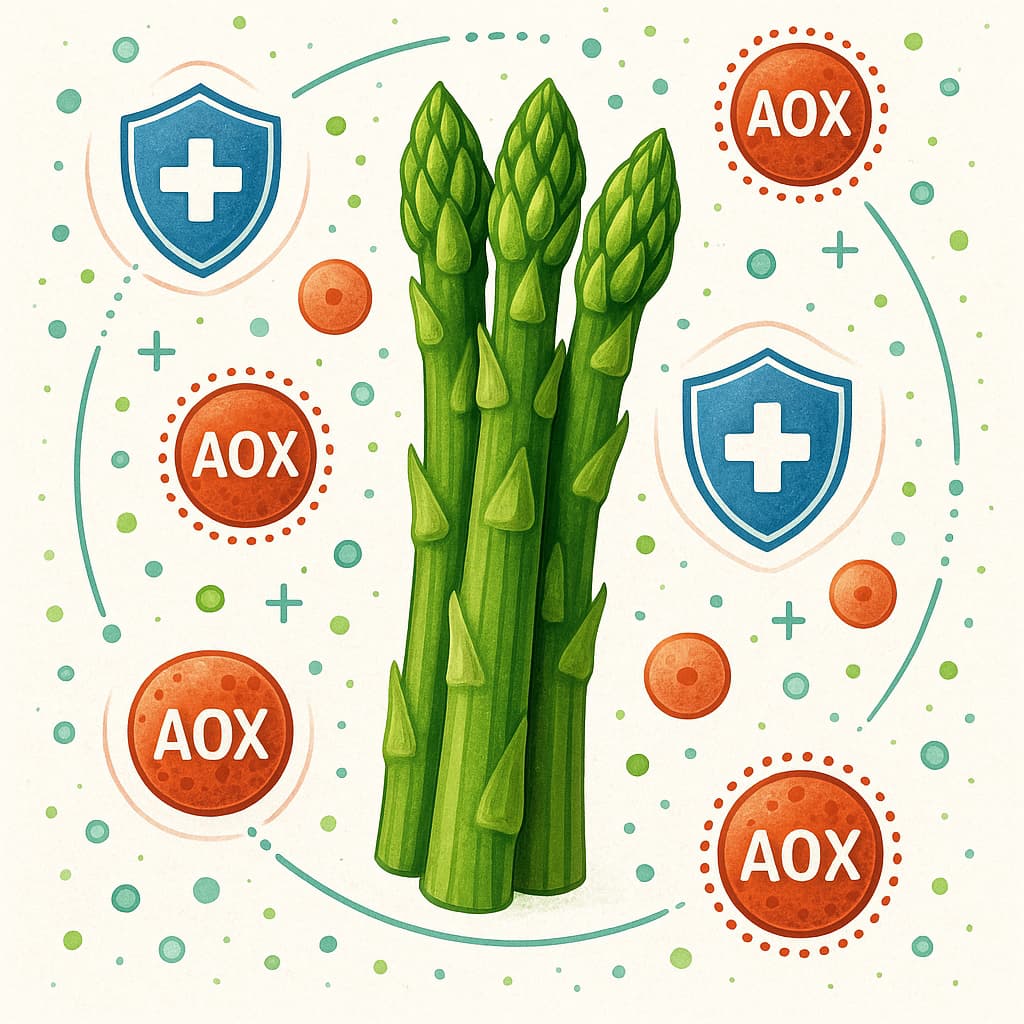
Asparagus offers vitamins A, C, and E, as well as flavonoids and saponins that function as antioxidants.
These compounds help neutralize free radicals, reduce oxidative stress, and support normal immune defense mechanisms.
A 2024 systematic review in Nutrients found that diets abundant in colorful vegetables and polyphenols enhance immune biomarkers and cellular resilience.
Adding asparagus to daily meals contributes to a diverse intake of plant antioxidants that support immune wellness over time.
7. Encourages Healthy Weight Management

Asparagus is low in calories yet rich in fiber and water, helping to promote fullness and reduce overeating.
- One cup of cooked asparagus provides about 40 calories and 3.6 grams of fiber.
- Fiber slows digestion and prolongs satiety, making it a helpful food for weight-conscious diets.
According to the Harvard T.H. Chan School of Public Health, dietary fiber from vegetables plays a vital role in managing appetite and supporting healthy weight maintenance.
Including asparagus in balanced meals can enhance volume and nutrient intake with minimal calories.
8. May Support Blood Sugar Balance
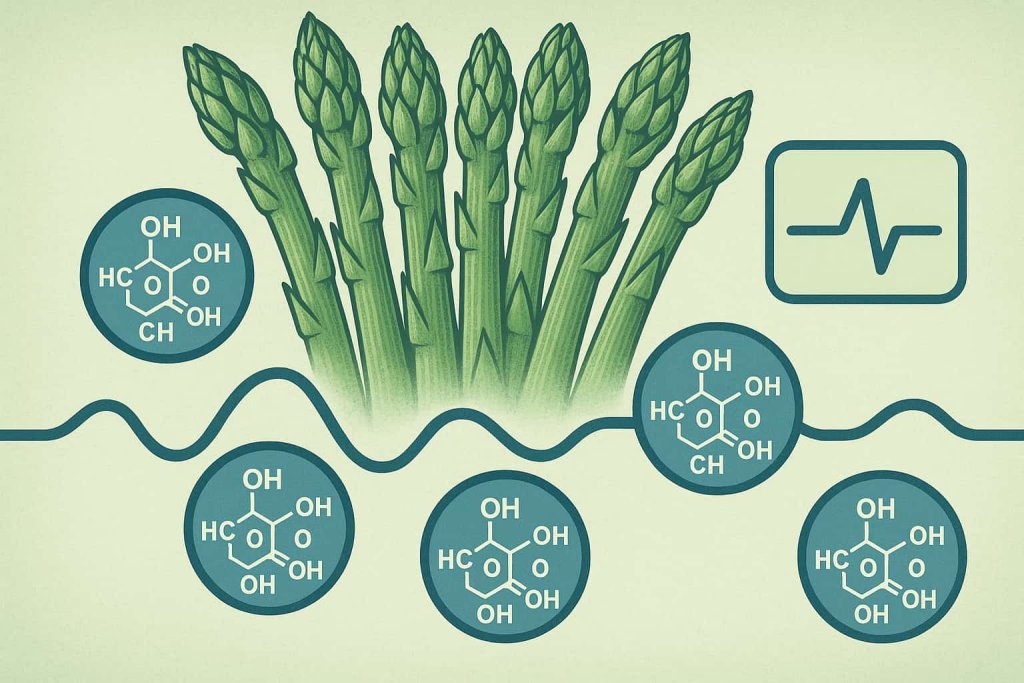
Emerging evidence indicates that asparagus and its bioactive compounds — including saponins and flavonoids — may support glucose metabolism.
A 2023 study in the Journal of Functional Foods suggested that asparagus extract may improve insulin sensitivity and reduce oxidative stress markers in animal models.
While more human studies are needed, pairing asparagus with lean proteins and whole grains can help stabilize blood sugar levels, making it a valuable addition for individuals focused on metabolic health.
9. Supports Brain and Nerve Health
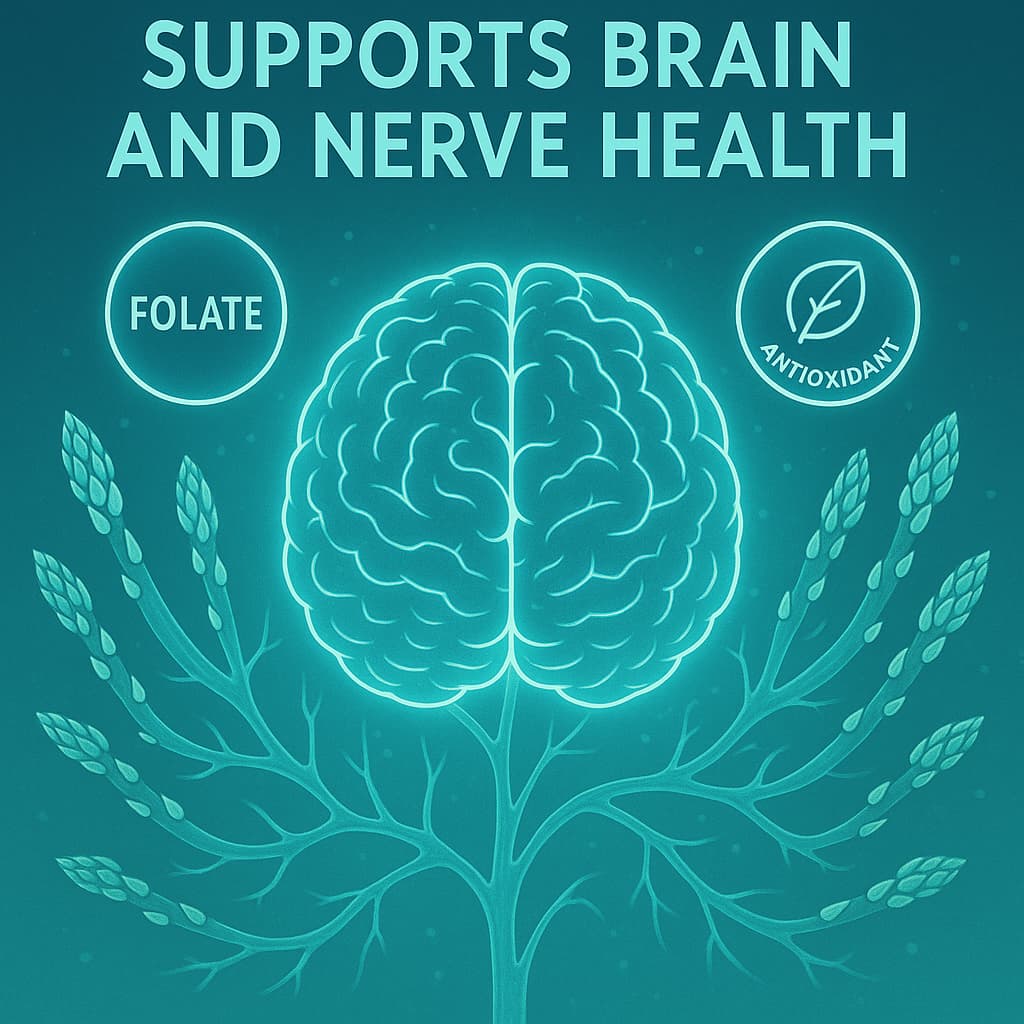
Folate and antioxidants in asparagus play a key role in supporting neurological function and maintaining healthy cognition.
- Folate supports neurotransmitter synthesis and overall brain cell communication.
- Adequate folate status is linked with reduced risk of cognitive decline and improved mental clarity.
The American Journal of Clinical Nutrition (2024) reported that maintaining sufficient folate intake may support memory performance and mood stability, particularly in older adults.
Regular consumption of folate-rich vegetables like asparagus contributes to brain and nervous system health throughout life.
10. May Support Longevity and Overall Wellness

Asparagus’s rich blend of vitamins, minerals, antioxidants, and prebiotic fibers aligns with dietary patterns associated with longevity, such as the Mediterranean and DASH diets.
- Its anti-inflammatory and antioxidant compounds may help reduce long-term oxidative stress.
- The high fiber and low-calorie profile support overall metabolic balance and digestive health.
According to the World Health Organization (WHO), consuming a variety of plant-based foods like asparagus is key to maintaining lifelong wellness and preventing chronic disease.
Incorporating asparagus several times per week can meaningfully contribute to overall vitality and long-term health.
How to Use or Cook Asparagus

Asparagus is a versatile vegetable that can be prepared in several healthy and flavorful ways. Proper cooking not only enhances taste but also preserves its valuable nutrients, including vitamin C, folate, and antioxidants.
Safe and nutritious preparation methods:
- Steaming: Retains most vitamins and gives a tender-crisp texture. Steam for 4–5 minutes until bright green.
- Roasting: Toss trimmed spears in olive oil, salt, and pepper; roast at 400 °F (200 °C) for 10–15 minutes.
- Grilling: Lightly brush with oil and grill for 3–5 minutes for a smoky flavor.
- Sautéing: Quickly cook with garlic and olive oil over medium heat for 5 minutes.
Pair asparagus with healthy fats like olive oil or a squeeze of lemon juice to improve absorption of fat-soluble vitamins A and K. Avoid overcooking—soft or dull-colored asparagus indicates nutrient loss.
For healthy vegetable-cooking techniques, visit the Harvard T.H. Chan School of Public Health – Cooking Vegetables.
Possible Side Effects and Precautions
While asparagus is safe and nutritious for most people, a few considerations apply for those with specific medical or digestive concerns:
1. Vitamin K and Blood Thinners
Asparagus is high in vitamin K, which plays a role in blood clotting. People taking anticoagulants such as warfarin should maintain a consistent intake of vitamin K–rich foods. Sudden increases or decreases can alter the drug’s effectiveness.
Learn more from the University of Iowa Health Care – Warfarin and Vitamin K Foods.
2. FODMAP Sensitivity
Asparagus contains fructans, a type of fermentable carbohydrate that may cause gas or bloating in individuals with irritable bowel syndrome (IBS). The Monash University Low FODMAP Diet notes that small portions (about ½ cup cooked) are usually well tolerated.
3. Urine Odor
Some people notice a distinct odor in their urine after eating asparagus. This harmless effect is caused by sulfur compounds derived from asparagusic acid. Sensitivity depends on genetics and does not indicate any health issue.
4. Gout Considerations
Although asparagus contains purines, research shows that vegetable purines do not raise uric-acid levels or gout risk like purines from red meat or seafood. The Arthritis Foundation confirms that moderate asparagus intake fits within a gout-friendly diet.
Storage and Food Safety Tips
Proper storage and safe handling help maintain the freshness, flavor, and nutritional quality of asparagus while reducing the risk of food-borne illness. Following FDA-recommended produce safety practices ensures that your asparagus remains safe to eat and full of nutrients.
1. Rinse Safely
Before cooking, rinse asparagus spears thoroughly under running tap water to remove dirt and debris. Do not use soap, bleach, or commercial produce washes, as these are not approved or effective for cleaning food. The U.S. Food and Drug Administration (FDA) emphasizes washing produce under running water only, using a clean brush or hands to scrub gently if needed.
2. Refrigerate Promptly
Asparagus should be stored at 40 °F (4 °C) or below to preserve its texture and prevent bacterial growth. Wrap the trimmed ends in a damp paper towel or stand the spears upright in a glass with about one inch of water. Cover loosely with plastic wrap and refrigerate immediately. According to the FDA – Are You Storing Food Safely?, keeping produce at safe temperatures is key to reducing spoilage and maintaining quality.
3. Avoid Cross-Contamination
Keep asparagus and other produce separate from raw meat, poultry, seafood, and eggs. Use separate cutting boards, knives, and utensils for produce and raw animal foods. The FDA – Safe Food Handling guide advises cleaning all surfaces and utensils with hot, soapy water after food preparation to prevent harmful bacteria transfer.
4. Monitor Refrigerator Temperature
Ensure your refrigerator maintains a temperature of 40 °F (4 °C) or lower, and your freezer stays at 0 °F (−18 °C). Using a refrigerator thermometer helps verify safe storage conditions. See FDA – Refrigerator Thermometers: Cold Facts about Food Safety for more details on proper appliance maintenance.
FAQs About Asparagus
1. Is asparagus safe during pregnancy?
Yes. It’s a natural source of folate, important for fetal development. Always wash and cook properly to avoid bacterial contamination.
2. Can people with kidney problems eat asparagus?
Moderate portions are safe for most. Those on renal diets should check potassium levels and consult a healthcare provider.
3. Does asparagus help with weight management?
Yes. Its high fiber and water content promote fullness and can support healthy weight goals as part of a balanced diet.
4. Why does asparagus change urine smell?
Metabolism of asparagusic acid produces sulfur compounds responsible for the odor—completely harmless.
5. Can people with gout eat asparagus?
Yes, in moderation. Vegetable purines don’t increase gout risk like animal purines.
6. How often should I eat asparagus?
Including 1 cup cooked asparagus several times a week fits easily within a nutrient-rich, plant-forward diet.
Conclusion
Asparagus is a nutrient-dense, low-calorie vegetable that supports heart, bone, and digestive health while contributing to overall wellness.
Its rich mix of vitamins K and C, folate, antioxidants, and fiber make it a valuable addition to everyday meals. Enjoying asparagus regularly—through steaming, roasting, or grilling—can enhance nutrient intake and long-term vitality.
This content is for informational purposes only and not medical advice.
References:
